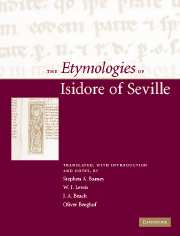Book contents
- Frontmatter
- Contents
- Acknowledgements
- Note to the Reader
- INTRODUCTION
- THE ETYMOLOGIES
- Analytical table of contents
- Book I Grammar (De grammatica)
- Book II Rhetoric and dialectic (De rhetorica et dialectica)
- Book III Mathematics (De mathematica)
- Book IV Medicine (De medicina)
- Book V Laws and times (De legibus et temporibus)
- Book VI Books and ecclesiastical offices (De libris et officiis ecclesiasticis)
- Book VII God, angels, and saints (De deo, angelis et sanctis)
- Book VIII The church and sects (De ecclesia et sectis)
- Book IX Languages, nations, reigns, the military, citizens, family relationships (De linguis, gentibus, regnis, militia, civibus, affinitatibus)
- Book X Vocabulary (De vocabulis)
- Book XI The human being and portents (De homine et portentis)
- Book XII Animals (De animalibus)
- Book XIII The cosmos and its parts (De mundo et partibus)
- Book XIV The earth and its parts (De terra et partibus)
- Book XV Buildings and fields (De aedificiis et agris)
- Book XVI Stones and metals (De lapidibus et metallis)
- Book XVII Rural matters (De rebus rusticis)
- Book XVIII War and games (De bello et ludis)
- Book XIX Ships, buildings, and clothing (De navibus aedificiis et vestibus)
- Book XX (Provisions and various implements)
- APPENDIX Correspondence of Isidore and Braulio
- INDEX
Book I - Grammar (De grammatica)
Published online by Cambridge University Press: 22 September 2009
- Frontmatter
- Contents
- Acknowledgements
- Note to the Reader
- INTRODUCTION
- THE ETYMOLOGIES
- Analytical table of contents
- Book I Grammar (De grammatica)
- Book II Rhetoric and dialectic (De rhetorica et dialectica)
- Book III Mathematics (De mathematica)
- Book IV Medicine (De medicina)
- Book V Laws and times (De legibus et temporibus)
- Book VI Books and ecclesiastical offices (De libris et officiis ecclesiasticis)
- Book VII God, angels, and saints (De deo, angelis et sanctis)
- Book VIII The church and sects (De ecclesia et sectis)
- Book IX Languages, nations, reigns, the military, citizens, family relationships (De linguis, gentibus, regnis, militia, civibus, affinitatibus)
- Book X Vocabulary (De vocabulis)
- Book XI The human being and portents (De homine et portentis)
- Book XII Animals (De animalibus)
- Book XIII The cosmos and its parts (De mundo et partibus)
- Book XIV The earth and its parts (De terra et partibus)
- Book XV Buildings and fields (De aedificiis et agris)
- Book XVI Stones and metals (De lapidibus et metallis)
- Book XVII Rural matters (De rebus rusticis)
- Book XVIII War and games (De bello et ludis)
- Book XIX Ships, buildings, and clothing (De navibus aedificiis et vestibus)
- Book XX (Provisions and various implements)
- APPENDIX Correspondence of Isidore and Braulio
- INDEX
Summary
i. Discipline and art (De disciplina et arte) 1. A discipline (disciplina) takes its name from ‘learning’ (discere), whence it can also be called ‘knowledge’ (scientia). Now ‘know’ (scire) is named from ‘learn’ (discere), because none of us knows unless we have learned. A discipline is so named in another way, because ‘the full thing is learned’ (discitur plena). 2. And an art (ars, gen. artis) is so called because it consists of strict (artus) precepts and rules. Others say this word is derived by the Greeks from the word ἀρετή, that is, ‘virtue,’ as they termed knowledge. 3. Plato and Aristotle would speak of this distinction between an art and a discipline: an art consists of matters that can turn out in different ways, while a discipline is concerned with things that have only one possible outcome. Thus, when something is expounded with true arguments, it will be a discipline; when something merely resembling the truth and based on opinion is treated, it will have the name of an art.
ii. The seven liberal disciplines (De septem liberalibus disciplinis) 1. There are seven disciplines of the liberal arts. The first is grammar, that is, skill in speaking. The second is rhetoric, which, on account of the brilliance and fluency of its eloquence, is considered most necessary in public proceedings. The third is dialectic, otherwise known as logic, which separates the true from the false by very subtle argumentation. 2. The fourth is arithmetic, which contains the principles and classifications of numbers.
- Type
- Chapter
- Information
- The Etymologies of Isidore of Seville , pp. 39 - 68Publisher: Cambridge University PressPrint publication year: 2006

